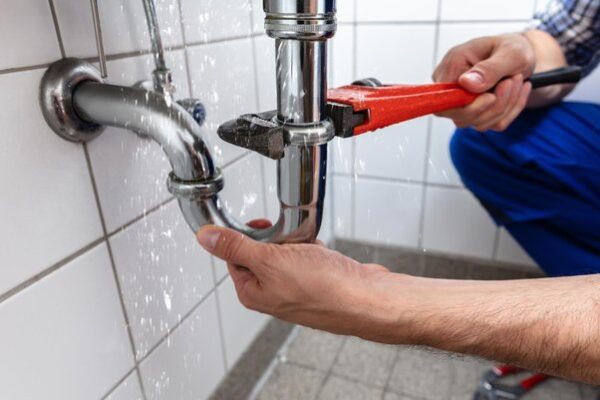
Plumbing emergencies can strike at any moment, catching us off guard and causing chaos in our homes. From burst pipes to overflowing toilets, these situations can be stressful and disruptive. However, it’s crucial to remember one thing above all else: don’t panic.
In this guide, we’ll walk you through the steps to take when faced with a plumbing emergency, ensuring you know exactly what to do to minimize damage and keep your home safe.
So, take a deep breath, and let’s dive into the essential actions you need to take to tackle a plumbing emergency head-on.
Recognizing a plumbing emergency
When it comes to plumbing, not every issue requires immediate attention. However, certain situations demand swift action to prevent further damage to your home. But what is considered a plumbing emergency? Here are some telltale signs that you’re facing a plumbing emergency:
- Flooding: If you notice water pooling on your floors, seeping through walls, or flooding your basement, it’s a clear indicator of a plumbing emergency. This could result from a burst pipe, malfunctioning appliance, or sewer line backup.
- Sudden Drop in Water Pressure: A sudden loss of water pressure throughout your home could indicate a significant issue, such as a burst pipe or water main break. If you turn on the faucet and only a trickle of water comes out, it’s time to investigate further.
- Sewage Backup: If sewage starts backing up into your sinks, toilets, or bathtub drains, it’s a serious plumbing emergency that requires immediate attention. Sewage backups pose health risks and can cause extensive damage to your property.
- Unusual Sounds: Gurgling or bubbling noises from your plumbing fixtures could signal a blockage or pressure buildup in your pipes. Ignoring these sounds could lead to a burst pipe or sewage backup.
- Foul Odors: Foul smells emanating from your drains or plumbing fixtures could indicate a sewer line blockage or backup. These odors are unpleasant and a sign of a potentially hazardous situation.
2. Taking immediate actions
When faced with a plumbing emergency, swift action is crucial to mitigate damage and prevent further complications. Here are the immediate steps you should take:
- Shut off the Water Supply: Locate the main water shut-off valve in your home and turn it off to stop the flow of water. This will prevent additional water from entering your home and causing further damage.
- Turn off Water Heater and Electricity: If the plumbing emergency involves water near electrical outlets or appliances, such as a flooded basement, turn off the electricity at the main breaker panel to avoid the risk of electrocution or electrical fires. Additionally, turn off the water heater to prevent damage if it operates on a water-filled system.
- Open Faucets to Drain Excess Water: After shutting off the main water supply, open all faucets in your home to drain any remaining water from the pipes. This can help alleviate pressure and reduce the risk of burst pipes.
- Collect Water in Containers: Use buckets, bowls, or any available containers to collect excess water and prevent it from spreading further. Place these containers strategically to catch water from leaks or overflowing fixtures.
Contacting Professional Help
While you may be able to address some plumbing emergencies on your own, many situations require the expertise of an emergency plumber Los Angeles. Here’s what you should consider when contacting professional help:
- Finding a Reliable Plumber: Start by researching and identifying reputable plumbing companies or individual plumbers in your area. Look for companies with positive reviews, certifications, and licenses to ensure quality service.
- Providing Necessary Information: When calling a plumber, be prepared to provide detailed information about the plumbing emergency. Describe the problem, its severity, and any actions you’ve already taken to address it. This will help the plumber assess the situation more effectively.
- Knowing When to Call Emergency Services: Some plumbing emergencies, such as a burst pipe or sewage backup, require immediate attention. If the situation poses a threat to your safety or property, don’t hesitate to call emergency services or your local plumbing emergency hotline for immediate assistance.
- Requesting Timely Service: Clearly communicate the urgency of your situation when scheduling a service appointment with a plumber. Many plumbing companies offer emergency services or prioritize urgent cases, so don’t hesitate to request prompt assistance if needed.
Temporary Fixes
In some cases, you may need to implement temporary emergency response plumbing fixes to manage a plumbing emergency until professional help arrives. Here are some temporary solutions you can try:
- Using Plumber’s Tape: For minor leaks in pipes or fittings, plumber’s tape can provide a temporary seal. Wrap the tape tightly around the leaking area to prevent further water leakage until a plumber can make a permanent repair.
- Placing Buckets Under Leaks: If you have a leaking pipe or fixture, place buckets or containers underneath to catch dripping water. This can help prevent water damage to floors, ceilings, and belongings while you await professional assistance.
- Using a Plunger for Clogged Drains: If you’re dealing with a clogged sink or toilet, a plunger can often provide a temporary solution. Use firm, consistent plunging motions to dislodge the blockage and restore proper drainage temporarily.
Don’t Let Plumbing Problems Drain You
In the face of any plumbing emergency examples, staying calm and taking swift action are your greatest assets. By recognizing the signs of a plumbing emergency, implementing immediate actions, and contacting professional help, you can effectively manage the situation and minimize damage to your home.
Remember, your safety and well-being are paramount, so don’t hesitate to seek professional assistance when needed. We highly recommend reaching out to a certified and reputable professional plumber to ensure your plumbing issues are resolved correctly and efficiently.
With the right knowledge and preparedness, you can conquer any plumbing emergency that comes your way. So, take charge of your plumbing fate, and let’s keep those pipes flowing smoothly!